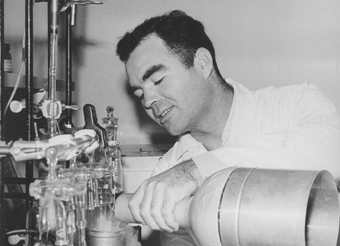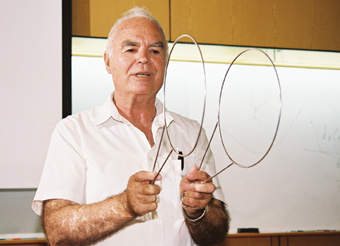Prof. Zeev Luz of the Institute’s Chemical Physics Department had wanted to be a teacher, and when he completed high school in 1950, there was a shortage of science teachers in the newly born state. The principal of his high school offered him a university scholarship – on the condition that he return to the school to teach, and Luz jumped at the chance. Around the time he was finishing his studies at the Hebrew University of Jerusalem, he heard about a new research field at Weizmann: Nuclear Magnetic Resonance (NMR), the Institute’s first NMR spectrometer having been built in the mid 1950s.
Luz, the youngest member of the group, joined the laboratory in 1957, spending half the week teaching and the other half (including weekends, holidays and frequent teachers’ strikes) in the lab. He remembers the pioneering feeling and excitement of those days: The spectrometer was one of a kind, essentially “hand-made” using electronic equipment left behind by the British army. The group became one of the first to use WEIZAC – the electronic computer built around that time at the Institute – to analyze their data.
The spectrometer enabled Luz to measure proton transfers – rapid chemical reactions that couldn’t then be measured by any other means. After completing his Ph.D., he went to Bell Labs in the U.S. for postdoctoral research and then returned to the Weizmann Institute’s Isotope Department. That early spectrometer was abandoned years ago, replaced by advanced “off-the-shelf” equipment, but NMR remains vibrant. Luz’s research involves dynamic processes and the molecular structure of materials. In an academic career spanning 50 years, he has been Dean of the Faculty of Chemistry and Vice President for Academic Affairs, and has received numerous prizes. But he has not forgotten his love for teaching – and he continues to give lectures to young people through Young@Science, visits to schools and participating in the annual Science Festival.

